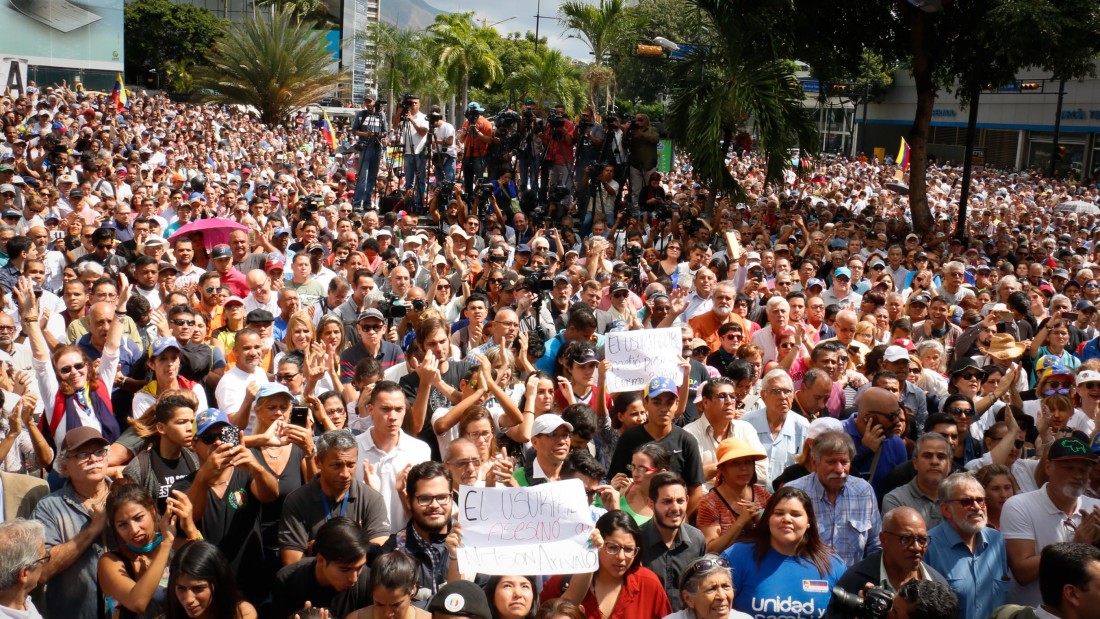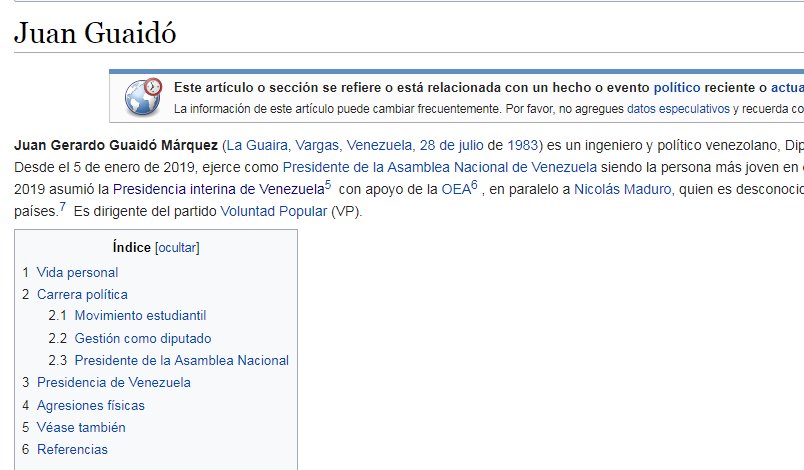Jumping Into the void
A Friday of confusion, Naky's here with the truth of everything that was told, what wasn't, what was implied, and what people totally made up, about Juan Guaidó's speech regarding power today in Venezuela. Oh, and the Battle of Wikipedia.


The fact that the National Assembly (AN) is now the recipient of the international community’s legitimacy is uncomfortable not just for chavismo, but for the opposition too. That explains why this strange Friday started with demands for Juan Guaidó to assume his “historic commitment,” including arguments (from exile) about why he had to do it, with the promise of digital ammunition ready to accompany him once the parallel government had started. None of the sages who demanded the Parliament Speaker’s immolation has managed to equalize the opposition’s objectives, much less defeat chavismo; but they still tend to attack the opposition much more fiercely than Nicolás, who has remained in power erasing any vestige of institutionality, increasing the weight of military power in this equation.
What did Guaidó say?
Despite the short time for the call and the risks associated with this government’s repressive pattern, there was a decent crowd before headquarters of the United Nations Development Programme (UNDP). Juan Guaidó emphasized that Nicolás is an usurper and with that idea as a starting point, he continued his thread on the pertinence of sticking to articles 233, 333 and 350 of the National Constitution and “assuming the competences of taking charge of president of the Republic because our Constitution says so.” In view of the bursting applause, Guaidó reacted with the hand raised and repeating the word “Ahora”, he made two rhetorical questions: “Is it enough to follow the Constitution? Is it enough to follow the Constitution in a dictatorship?” questions that he’d use to talk about the need to have the support of the people, the Armed Forces and the international community, to help us “clearly take up this mandate that we won’t reject, that we’ll exercise.” Guaidó also called all Venezuelans to march on January 23.
Taking charge
Oratory isn’t one of Guaidó’s gifts, so on top of his performance on the stage, we have to add the words he chose, those that allowed for his speech to be perceived by most as ambiguous. Once the open assembly ended, he ratified with tweets the key messages of his speech and, with them, clarified that in order to end the usurpation, the unity of the people, the Armed Forces and the international community is a requirement for establishing a transition government and a call for free elections. Guaidó didn’t say he’d take up the Presidency of the Republic neither in his speech nor his tweets, he simply spoke about taking charge of the post, which in our laws means temporarily fulfilling the duties of an absent authority.
Interim President
Just a few minutes later, two important messages came together to complicate the situation further. First came the salute of OAS Secretary General Luis Almagro, celebrating Guaidó’s “assumption as interim President of Venezuela in compliance to article 233 of the Political Constitution,” swiftly followed by the press releases issued by Voluntad Popular and the National Assembly itself, where Guaidó’s words were twisted and presented as: “In compliance with articles 233, 333 and 350 of the CRBV, the AN Speaker assumed the competences of the Presidency of the Republic and, together with the people and the FAN, call for free and transparent elections.” This information kicked the hornet’s nest of the hyperinformed Twitter-sphere. The National Assembly staff took hours to correct the press release, but they left no record of such an important errata. Apparently, the “war” for editing Juan Guaidó’s profile on Wikipedia was much more interesting.
Chavismo’s contributions
Prisons Minister Iris Varela once again showcased her vulgarity and despotism, because in a sort of extrajudicial trial held while she was writing her tweet, she warned the Speaker of Parliament: “Guaidó, your cell’s all set up, with your respective uniform, I hope you appoint your cabinet quickly so I can know who’s going to accompany you, stupid kid.” Meanwhile, some ANC members such as Olga Álvarez, claimed that Guaidó had committed “a flagrant crime against the republican form” and should be immediately arrested and taken before the competent authorities.
Nicolás’s Guaire
The usurper asked the people to remain on the streets because that’s “the guarantee of peace, of stability (…) it’s the vaccine against any adventure, madness, destabilization process,” adding that “there are crazy minds, immature minds leading the opposition seeing what they can come up with,” saying that the entire deal was a show. Nicolás even mused about the possibility of calling the opposition and yielding the presidency to them, only to emphasize that they wouldn’t even pronounce Guaidó’s last name right (so they’d call him Gauire, like the Caracas river that Chávez promised to sanitize,) that he doesn’t have a plan or a team and that, according to him, the opposition “is non-viable, it has no faculties or capacities to assume political power.” The usurper foresaw that “they’ll come up with a new show each day,” so he urged people not to join what he called a “Twitter coup.”
…
It was a day with many uncertainties, not only for the possibility that the mistakes weren’t such, but actually part of a strategy, but because if that’s not the case, each mistake diminishes the clarity of mind that we sorely need. The usurper has no legitimacy but he controls the Armed Forces, while the National Assembly controls a legitimate power but has no means of coercion, that’s why we must create the currently non-existent conditions, to advance toward a transition government; we must unite forces and support the National Assembly, with a strategy and political pressure.
Caracas Chronicles is 100% reader-supported.
We’ve been able to hang on for 22 years in one of the craziest media landscapes in the world. We’ve seen different media outlets in Venezuela (and abroad) closing shop, something we’re looking to avoid at all costs. Your collaboration goes a long way in helping us weather the storm.
Donate






